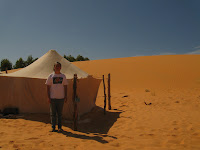After we got back to Senegal we headed out to Lompoul, a little village near the coast just a few hours outside Dakar. On the way there I just kept being impressed by how fancy the Louga area is. There are more gas stations and shops in each of the little road towns than there are in all of Kedougou, and the side roads are paved, all the way out to some of the smaller villages. Paved!
Anyway. The Gite Lompoul campement was pretty much empty when we got in, so we just puttered around, checking out out out tent and the dunes, until lunch was ready. The sand was really soft, which made it nice to walk on but hard to get any speed up when sliding down on the snowboard they leave out for people to play on.
After lunch we went for a camel ride. Camels are much bigger than I was expecting, and their legs and feet were much stranger-looking than I'd imagined.
Walking along the dunes was nice, the camels plodded along, making weird, grimacing faces every once in awhile, and the crust of the sand cracked and crumbed prettily under their feet. The lovely pre-sunset sunlight, the hushed sound of sand blowing softly over sand, the rustle of leaves on the occasional tree - it was much more placid than I'd anticipated, but I liked it nonetheless.


That evening we had dinner with the thirty-or-so middle-aged French tourists staying int he other tents - there was drumming and hilariously bad dancing and some better dancing and a lot of "oh, your French is so good for an American!" and a pretty decent dinner. (The cooks there have nothing on my hosts moms, but it was good and there were some vegetables so no complaints.) The next morning we walked from Lompoul-Village to Lompoul-sur-Mer, to the slight consternation of the guides, who were concerned that we would not be able to make the grueling 8 km (about 5 miles) trek out to the seashore unaccompanied and with our daypacks strapped to our backs.
As it turns out, it was a flat and pleasant stroll, and took a little over an hour. We dawdled here and there, admiring first the dunes, then the eucalyptus groves, then the thorn-tree flats, and finally the little patch of Dr.Seuss-ish evergreens that cropped up just before we hit the beach. As soona s we arrived in the town of Lompoul-sur-Mer we saw a couple of the
campement guides who'd driven in to buy fish and supplies; they seemed happy and amused to see that we'd made it, intact and in record time.
The beach smelled like chum and was strewn with fish heads and guts, so we didn't linger much. We found a car back to the road town, and then another one from there to Dakar, where we set about getting things together and packing up to head out on our respective long hauls back to the places that we live.







































